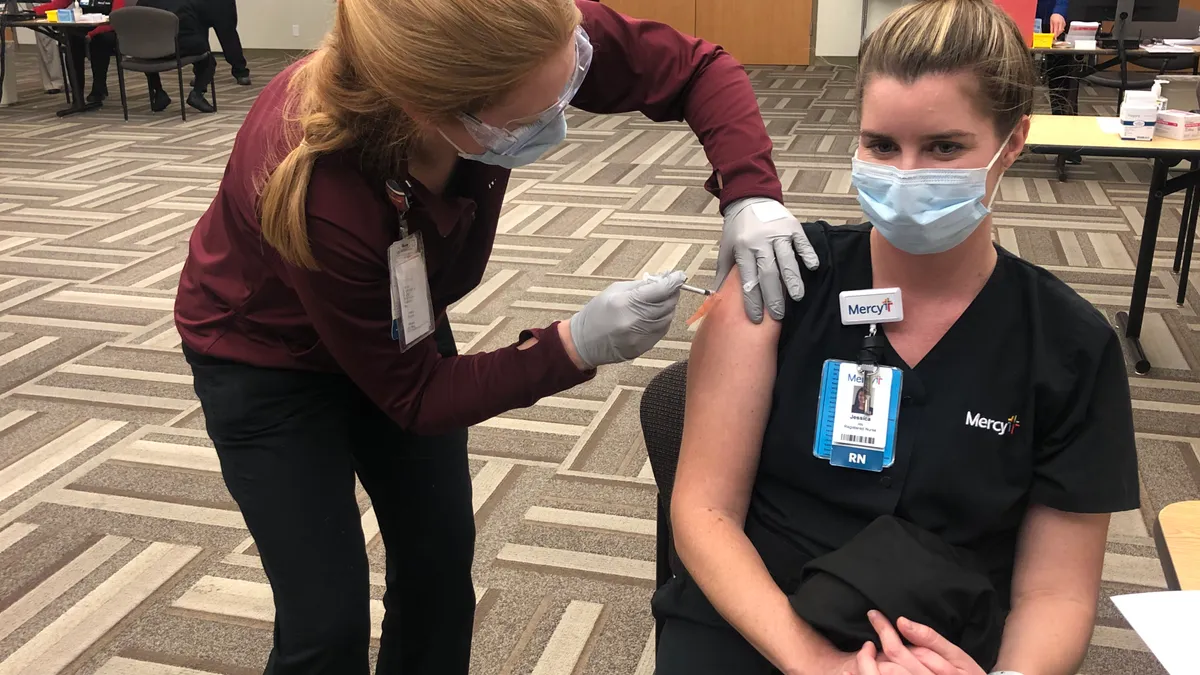Dive Brief:
- Employers can require proof that employees received a COVID-19 vaccine — with some exceptions, the U.S. Equal Employment Opportunity Commission said in Dec. 16 guidance.
- COVID-19 vaccinations approved by the Food and Drug Administration do not constitute medical examinations under the Americans with Disabilities Act, the EEOC said, but certain inquiries could implicate the ADA's rules on disability-related inquiries. Employers requiring vaccination or proof of vaccination must show that such inquiries are job related and consistent with a business necessity.
- While federal law sometimes requires employers to grant exemptions for religious or disability accommodations, companies may be able to exclude workers who can't receive a COVID-19 vaccine under certain circumstances.
Dive Insight:
The agency's update is a highly anticipated development during the same week the first COVID-19 vaccines were administered to U.S. healthcare workers. While the guidance provides clarifications on questions pertaining to various federal laws, EEOC said that "EEO laws do not interfere with or prevent employers from following CDC or other federal, state and local public health authorities' guidelines and suggestions."
Notably, the guidance specified that administering a COVID-19 vaccine to employees, or requiring proof that employees received a COVID-19 vaccine, does not involve the use of genetic information to make employment decisions nor the acquisition or disclosure of genetic information.
If a company requires employees to provide proof that they received a COVID-19 vaccine from their healthcare provider, "the employer may want to warn the employee not to provide genetic information as part of the proof," EEOC said. So long as employers provide this warning, any information received in response would not be considered unlawful, the agency added.
If an employee is unable to receive a vaccine due to a disability, the employer should conduct an individualized assessment to determine whether that person poses a "direct threat scenario." If a direct threat cannot be reduced to an acceptable level via reasonable accommodation, the firm may exclude the employee from physically entering the workplace, the agency said.
Similarly, if an employee is unable to receive a vaccine due to a sincerely held religious practice or belief, and no reasonable accommodation possible, an employer legally may exclude that individual from the workplace.
In response to an inquiry from HR Dive, our sister publication, about whether the guidance permits employers to implement policies that require employees to receive a COVID-19 vaccine, and EEOC spokesperson said in an email that the guidance "only sets out the requirements under the EEO laws" as well as the Title VII and Americans with Disabilities Act requirements that employers would need to satisfy to require a vaccine.
"Emergency Use Authorization COVID-19 vaccines fall within the domain of the FDA," the spokesperson said. "If employers have questions about EUA vaccines, they should contact FDA."
Management-side counsel who previously spoke to HR Dive identified other areas employers may need to consider in deciding whether to mandate vaccination. For example, employers operating in workplaces with labor unions may need to first consider bargaining with their unions before issuing a mandate. There may also be concerns about compliance with the National Labor Relations Act in the event that groups of employees refuse to be vaccinated, which may constitute protected activity under federal as well as state or local laws.
















